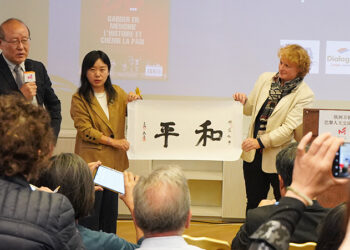On Saturday September 27, Paris seemed to be fall colors. In the tumult of a world crossed by wars, tensions and uncertainties, the city found, for a conference, its pacifist lights. As Emmanuel Levinas wrote, “peace is not rest, but the vigilance of responsibility towards the other”. This vigilance was embodied in the seminar “Dialogue China-France: cherishing peace-building the future”, organized on the occasion of the 80ᵉ anniversary of anti-fascist victory.
For five years, the review China-France dialogue strives to build a bridge between two civilizations, to dialogue the memories and the visions of the future, to recall that peace is a patient construction, the fruit of assumed memory and the shared future. This meeting has confirmed how philosophy, ethics and humanity must remain at the heart of our understanding of the world.
The memory of sacrifices, the foundation of the future
In his speech, Mr. Wang Jian, Minister Advisor to the Chinese Embassy in France, recalled the immense dimension of the sacrifice granted by China in the war against Japanese aggression: “With 35 million injured or lost lives, his sacrifices were immense. His efforts effectively supported the allies engaged in other operational theaters ”. China was thus a pillar of world victory, often overlooked in Western stories.
France, too, has inscribed in its history the resistance to Nazism, from the mobilization of “companions of the liberation” until the liberation of Paris. As Zhao Lijun, director of the Center Europe-Africa International Communication Group, pointed out, the destinies of the two peoples joined the test: “The French people, through the movement of free France, showed admirable resilience, while figures like the French doctor Bussière helped China, and the Chinese journalist Xiao Qian reportedly reported to the war in Europe”. These crossed accounts recall that, even at the heart of barbarism, mutual aid and human solidarity have transcended the borders.
The intervention of Lyazid Benhami (vice-president of the Franco-Chinese friendships of Paris) highlighted the decisive contribution of combatants from Asia, Africa and the Caribbean: “India provided the largest army of volunteers in history, the Senegalese skirmishers paid with their life an immense tribute, and China has held a front line for the whole world”. However, these sacrifices are too often absent from textbooks and official commemorations.
To remember is already to resist the temptation of barbarism. It is also recognizing that the 1945 victory was a collective and planetary work, which today engages the responsibility of all to preserve the legacy of peace.
Speeches have converged on the same idea: peace is not an acquired state, it is a permanent ethical responsibility. Yves-Jean Gallas, vice-president of the French Peace Movement, retraced the history of pacifist struggles in France, from Romain Rolland to Joliot-Curie. He recalled the 1950 Stockholm call, which aimed to ban nuclear weapons and was signed by nearly 300 million people worldwide. “The fight against nuclear weapons is part of our DNA,” he said, recalling how much the sustainable development objectives and the UNESCO peace culture constitute concrete action guides.
Jean Pegouret, president of Saphir Eurasia, insisted on the vigilance that peace requires: “Peace is war that rests,” he said, before adding that injustices left by humiliating treaties or punitive peace are often the germs of future conflicts. From Versailles to Brest-Litovsk, from the loss of Alsace-Lorraine to the humiliation of China by unequal treaties, history shows that only just peace can prevent cycles of revenge.
This requirement finds an echo in the call launched by President Xi Jinping during commemoration to Beijing: learning from history, paying tribute to the heroes who have fallen, cherish peace and embrace a better future. Peace is therefore inseparable from memory and justice. It implies an ethical commitment, which goes beyond geopolitical calculations to question our humanity.
In an era when geopolitical fractures are widening, Sino-Français dialogue resonates as a moral and political imperative. Zhao Lijun recalled that “for sustainable peace and development, it is necessary to go beyond ideologies, to break the geopolitical barriers, and to substitute cooperation with the game with a zero sum”. France and China, strong of their history and their diplomatic independence, bear a particular responsibility in this area.
Since 1964, the date on which General de Gaulle and Zhou Enlai have opened the way to dialogue, the two countries have endeavored to maintain a relationship based on equality and cooperation. Cultural, scientific and political exchanges have shown that it is possible to trace alternative pathways to block manicheism.
The review China-France dialogue is part of this inheritance. In five years, with 25 issues published, she has offered a unique mutual understanding platform. As Zhao Lijun recalled, this editorial work is a precious contribution to “bringing hearts closer, sharing stories, and building a bridge of understanding”.
In a world where disinformation threatens to nourish fear and withdrawal, each word published, each dialogue organized, each facilitated meeting becomes a stone with the fragile but essential building of peace.
The September 27 seminar recalled a simple but deep obvious: peace is a collective work, a permanent project that requires memory, responsibility and dialogue. It cannot be decreed: it is built, patiently, by peoples and generations.
Through crossed interventions, a common philosophy has emerged: cherishing peace is assuming the weight of past sacrifices, refusing humiliations that feed revenge, and promoting a fairer and equitable global order.
As Lyazid Benhami pointed out, peace cannot be reduced to the absence of war: it is also justice and dignity. It is this dignity that China and France, together, can help defend in a multipolar world.
For five years, China-France dialogue strives to carry this flame, by weaving ties of culture, friendship and shared responsibility. In the hope that yesterday’s sacrifices become the foundations of a more human future, the commitment remains clear: to build a living, vigilant, and always open to the other.
*Sonia Bressler East Philosopher and founder of the Silk Road – Editions.







